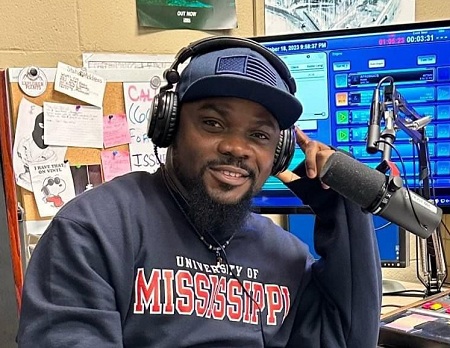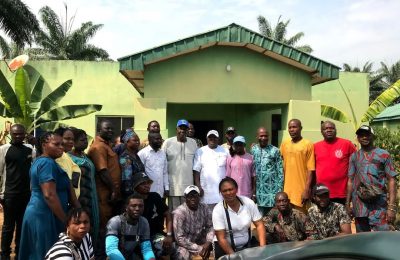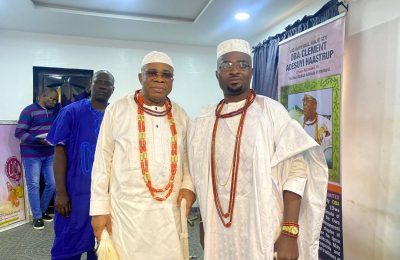

The language and culture tapestry in a country like Nigeria with over 250 ethnic groups and where over 525 indigenous languages are spoken, comes with challenges and opportunities. The intersection of diverse, if not complex, languages and cultures in education, social, and business milieus, such as schools, religious centres, markets, and corporate places are zones of tension and competition that should be handled with understanding for any meaningful engagement to suffice.
In Nigeria, language and cultural studies have never been given much attention like the sciences, engineering, medicine, business, and education. This is despite the immense benefits language and its studies offer in terms of conflict resolution, diplomacy, cultural harmony, and information dissemination.

Horeb Midjochedo Anthony, language scholar, media practitioner, and culture advocate, believes that language ─ local and foreign ─ is equally as important and relevant as medicine, engineering, and the like, and that was why he “willingly” chose to study language from the undergraduate to the doctorate level. Not only did he decide to study foreign languages, he uses foreign languages in his media, entertainment, advocacy, and community endeavours.
In a recent interview, Anthony summarised his passion for language thus: “I grew up falling in love with languages. I chose to study languages not because I hated science subjects. However, I have always wanted to be an international journalist. Hence, speaking more than one language officially became a necessity.”
In the interview, he spoke extensively on the role of multilingualism and cultural diversity in national development. He deployed his skills as a broadcaster, language teacher, applied linguist, intercultural communicator, conversation analyst, and translation expert to proffer solutions to some of the language and cultural challenges facing the country.
Anthony is a graduate instructor of French and a PhD student at the University of Mississippi, United States. He revealed that since 2021 he started his studentship at Mississippi ─ as an executive member of the Modern Languages Graduate Students Colloquium on Applied Linguistics and Tesol ─ the university has opened his eyes to deeper knowledge of the vital function of language in the world because people and nations do mostly everything through words.
He stated that his research at the University of Mississippi focuses on second language acquisition, language policy and planning, and language preservation. He further stated that one of the criticisms against language policy in Africa is that it promotes colonial languages to the detriment of indigenous languages. He noted that in some African countries where the policy recommends indigenous languages, there are still inadequacies in its implementation.
“A multilingual nation also needs a multilingual policy in which minority groups kept at the lower part of the ladder are not denied their language rights while being forced to abandon their language and embrace that of the majority group,” he said.
His love for indigenous languages, he revealed, led him to focus his ongoing PhD work on the minority language preservation in Nigeria, with his dissertation titled ‘A sociolinguistic analysis of the activities of the Ogu General Assembly towards the preservation of Gugbe in Nigeria’.
According to him, the OGA is a sociocultural, economic, and political group fighting for the well-being of the Ogu people of Nigeria and their language, Gugbe. He stated that he became interested in their activities and was curious about how they plan to achieve their goal of maintaining Gugbe, because the latter, in contact with Yoruba, is facing a shift.
Anthony noted that the OGA group made the right decision because language rights are important just as every other human right declared by the United Nations. He said his research will bring the activities of the OGA to the scientific spotlight ─ and, as an applied linguist, he is in the right position to make recommendations where necessary.
While speaking about the national policy of Nigeria, he admitted that the policy is acceptable, but that instead of “mother tongues”, the policy says “the language of the immediate environment”. He noted that for instance, in places like Badagry, where the majority of the people are Gugbe speakers, the Yoruba language is still considered the immediate language. He revealed that the implication is that the children whose native language is Yoruba have an advantage over the other children (the Gugbe speakers) who will have to learn Yoruba as a second language thereby denying them the right to learn their own language at school.
More than a decade ago, at the University of Lagos, Anthony was a journalist in the French department of the university’s radio station, a position he started the same months he got admission into the Department of European Languages and Integration Studies of the university in 2010. His role on the campus radio was to promote the French language in the university and Lagos. He summed up his role on the job as thus: “Considering the bilingual ambience the programme creates on our campus and in Lagos, I continued with it till 2020 before I travelled out for my doctoral programme in the United States.”
Reacting to some Nigerians who think it is a waste of time and money to study a foreign language in a tertiary institution when there are many Nigerian languages to study, he argued that learning a foreign language is never a waste of money or time. He advised language learners to add a skill to their language learning. He also advised that the Departments of Language Studies in Nigerian universities must review their course programmes to meet the demands of the job market. “Otherwise, we will continue to produce graduates who will not be employed but run back to teaching,” he added.
Anthony stressed that the need to foster multilingualism in the county goes beyond education, research, politics, and national policy. He demonstrated through his works in arts, media, music, and entertainment why multilingualism and multicultural endeavours are what make a nation unique.
As a student at the Nigerian French Language Village for the compulsory linguistic immersion programme, he created Horeb Infos, a campus daily newspaper in the French language, and later interned at Tokpa 104.1 in Cotonou, Benin Republic.
As a PhD student at the University of Mississippi, he currently hosts a musical and talk show ‘Afrobeats and Overseas Vibes’ on the campus radio, which according to him, was the university’s way of promoting inclusion through diversity. “On the show, we talk about issues affecting Africans and Caribbeans, and I play African and Caribbean songs which expose the university community and its surroundings to African and Caribbean cultures,” he added.
In 2016, in Cotonou, Benin Republic, Anthony was honoured with the prestigious African “Meilleur Présentateur Live” award at the 11th edition of the Stars of African Cultural Integration (SICA), an event usually sponsored by the Nigerian and Beninois forces because it played significant roles in resolving conflicts within the borderline communities because of the linguistic barriers and some other factors. About winning the SICA award, he said, “I spent some time working as a volunteer with the secretary of the Nigerian-Benin Transborder Forum, Dr Bonny Botoku. It was upon seeing my ability to use interpretation to solve conflicts that he nominated me to represent Nigeria at the 2016 live presenters auditioning.”
The importance of discussing multilingualism and the preservation of indigenous languages in Nigeria cannot be overemphasised. Studying and preserving indigenous languages is crucial for cultural identity and societal cohesion. Studies have shown that indigenous languages are not just communication tools ─ they embody the heritage, values, and unique perspectives of a community. They serve as vehicles for transmitting traditional knowledge, provide a sense of belonging, foster cultural pride among ethnic groups, and offer history from one generation to the next.
READ ALSO: IGP Egbetokun condemns alleged Police extortion in Bayelsa, other states








